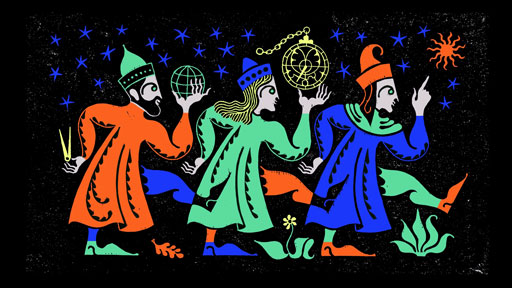
Arriving Not A Moment Too Soon
Journey of the Magi
T. S. Eliot
‘A cold coming we had of it,
Just the worst time of the year
For a journey, and such a long journey:
The ways deep and the weather sharp,
The very dead of winter.’
And the camels galled, sore-footed, refractory,
Lying down in the melting snow.
There were times we regretted
The summer palaces on slopes, the terraces,
And the silken girls bringing sherbet.
Then the camel men cursing and grumbling
And running away, and wanting their liquor and women,
And the night-fires going out, and the lack of shelters,
And the cities hostile and the towns unfriendly
And the villages dirty and charging high prices:
A hard time we had of it.
At the end we preferred to travel all night,
Sleeping in snatches,
With the voices singing in our ears, saying
That this was all folly.
Then at dawn we came down to a temperate valley,
Wet, below the snow line, smelling of vegetation;
With a running stream and a water-mill beating the darkness,
And three trees on the low sky,
And an old white horse galloped away in the meadow.
Then we came to a tavern with vine-leaves over the lintel,
Six hands at an open door dicing for pieces of silver,
And feet kicking the empty wine-skins,
But there was no information, and so we continued
And arrived at evening, not a moment too soon
Finding the place; it was (you may say) satisfactory.
All this was a long time ago, I remember,
And I would do it again, but set down
This set down
This: were we led all that way for
Birth or Death? There was a Birth, certainly,
We had evidence and no doubt. I had seen birth and death,
But had thought they were different; this Birth was
Hard and bitter agony for us, like Death, our death.
We returned to our places, these Kingdoms,
But no longer at ease here, in the old dispensation,
With an alien people clutching their gods.
I should be glad of another death.
The story of the Magi is found in Matthew’s Gospel. As with all myths the interpretations which can be made are infinite. We may understand the “Christmas story” from that of a crass commercial pitch, to this angle of view by T.S. Eliot. This is nothing other than a metaphysical view, a world changing, rotation-of-axis experience that makes me shudder. Wiped away are hallmark cardesque halos, star illumination of a holy family, angel choir, etc. This excavation says that life at it’s foundation is a long journey, a grind for everybody. The terminus, a stopping-place catches each individual by surprise. Arrival is propitious, at-the-right-time. “Arrival” amounts to a denouement: that living is simultaneously a dying. We receive and we give, to “get” and to “give up” are reciprocal, this dance if you will to a solemn melody. Is the better word, “melancholy?”
In any case the melody is precious, beautiful even.